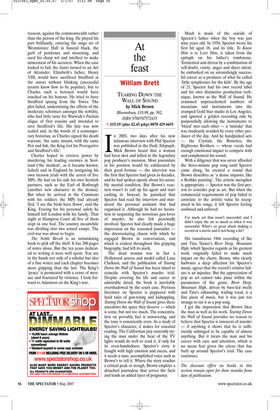At the feast
William Brett
TEARING DOWN THE WALL OF SOUND by Mick Brown Bloomsbury, £18.99, pp. 502, ISBN 9780747572435 ✆ £15.19 (plus £2.45 p&p) 0870 429 6655 In 2003, two days after his now infamous interview with Phil Spector was published in the Daily Telegraph, Mick Brown heard that a woman had been shot and killed in the legendary pop producer’s mansion. Most journalists in his position would be exhilarated by their good fortune — the interview was the first that Spector had given in decades, and he had spoken openly about his unstable mental condition. But Brown’s reaction wasn’t to call up his agent and start cashing in. Instead, he panicked that Spector had read the interview and murdered the personal assistant that had organised it. Although he had no hesitation in suspecting the notorious gun-lover of murder, he also felt personally involved. Spector had clearly made a huge impression on the seasoned journalist the disorientating charm with which he engaged Brown in conversation, and which is evident throughout this gripping biography, had left its mark.
The dead woman was in fact a Hollywood actress and model called Lana Clarkson, and the publication of Tearing Down the Wall of Sound has been timed to coincide with Spector’s murder trial. Despite covering his life and career in admirable detail, the book is inevitably overshadowed by the court case. Previous literature on Spector is peppered with lurid tales of gun-toting and kidnapping. Tearing Down the Wall of Sound gives these anecdotes the space they deserve — which is some, but not too much. The concentration on provable fact is unwavering, and the tone is consistently even. As a study of Spector’s character, it makes for essential reading. The Californian jury currently trying the man under the heat of the TV lights would do well to read it, if only for its even-handedness. Spector’s story is fraught with high emotion and excess, and it needs a sane, accomplished voice such as Brown’s to tell it. Where the story reaches a critical peak or trough, Brown employs a detached journalese that serves the facts and lends an added layer of poignancy. Much is made of the suicide of Spector’s father when the boy was just nine years old. In 1958, Spector wrote his first hit aged 18, and its title, To Know Him is to Love Him, is taken from the epitaph on his father’s tombstone. Tormented and driven by a combination of self-doubt, vanity, anger and sheer talent, he embarked on an astonishingly successful career as a producer of what he called ‘little symphonies for the kids’. By the age of 21, Spector had his own record label and his own distinctive production technique, known as the Wall of Sound. He crammed unprecedented numbers of musicians and instruments into the cramped Gold Star studio in Los Angeles, and ignored a golden recording rule by purposefully allowing the instruments to ‘bleed’ into each other — a ‘mistake’ that was studiously avoided by every other producer of the day. And he handpicked acts — the Crystals, the Ronettes, the Righteous Brothers — whose vocals had enough emotional impact to compete with and complement his sound.
With a diligence that was never afforded the three-minute pop song until Spector came along, he created a sound that Brown describes as ‘a dense impasto, like a Rothko painting’. The artistic metaphor is appropriate — Spector was the first person to consider pop as art. But when the commercial requirements of pop failed to correlate to the artistic value he recognised in his songs, it left Spector feeling confused and unloved:
I’ve made art that wasn’t successful; and I didn’t enjoy the art as much as when it was successful. What’s so great about making a record or a movie and it not being a hit?
His tumultuous 1966 recording of Ike and Tina Turner’s River Deep, Mountain High, which Spector regards as his greatest work, originally failed to make much impact on the charts. Brown, who clearly harbours a deep affection for Spector’s music, agrees that the record’s relative failure is an injustice. But the appreciation of pop as art cannot take place within the parameters of the genre. River Deep, Mountain High, driven by bass-led swells and Tina’s exhausting, wailing vocal, is a fine piece of music, but it was just too strange to cut it as a pop song.
I get the impression that Brown likes the man as well as his work. Tearing Down the Wall of Sound provides no reason to believe that Spector is innocent of murder — if anything it shows that he is sufficiently unhinged to be capable of almost anything. But it treats the man and his career with care and attention, which is no mean feat given the circus that has built up around Spector’s trial. The case continues.
The discount offers on books in this section remain open for three months from date of publication.


































































































 Previous page
Previous page